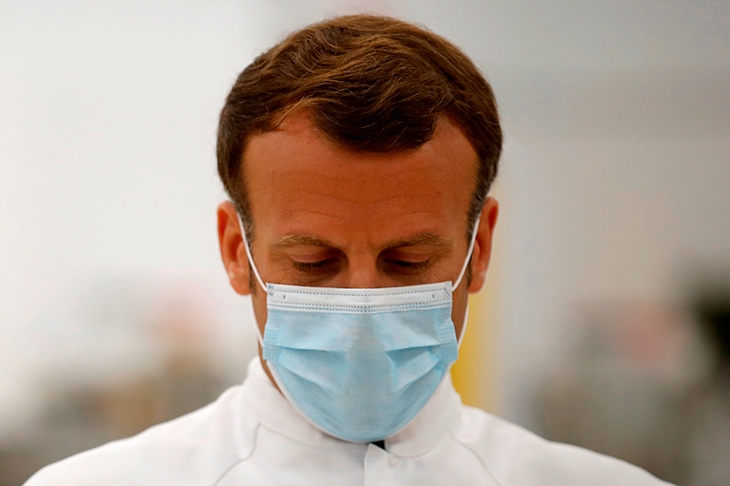In 2000, this magazine dipped its toe in murky Irish water. Stephen Glover wrote three articles, one provocatively entitled ‘The Republican cell at the heart of the Guardian’. (For more detail, see Douglas Murray’s article.) One of the IRA supporters identified was Roy Greenslade, the paper’s media commentator. Alan Rusbridger, the Guardian’s editor, wrote angrily to the then editor, Boris Johnson, demanding an apology. Boris refused. Now Greenslade has emerged from that murky water, with an armalite in one dripping hand, and admitted he always secretly supported IRA violence and was close to IRA leaders. Where does his admitted ‘entryism’ leave the Guardian? I understand that Alan Rusbridger, editor from 1995 to 2015, insists he did not know about Greenslade’s deception and that, if he had, he would have got rid of him. The Guardian has an interesting excuse for its inattention. Consulting Tony Blair, Mo Mowlam, security sources etc, Rusbridger was assured the IRA was to be trusted. This does not, of course, explain any Guardian leniency towards Greenslade before Blair’s victory in 1997 (think of the 1996 Canary Wharf bomb, for instance), but it does point to something else. From 1997, Glover was so struck by Greenslade’s closeness to Blair’s head of communications, Alastair Campbell, that he invented a ‘pantomime horse’ called Mr Campbell-Greenslade. Did the Campbell half of the horse know what the Greenslade half was up to? If so, did he support it? If not, does he feel betrayed?
A reader sends a photo of the Scotland Act 1998 still proudly displayed inside the Scottish parliament. It is open at the title page, inscribed to Donald Dewar, the first First Minister of Scotland: ‘To Donald — it was a struggle; it may always be hard; but it was worth it. Scotland & England together on equal terms! — Tony Blair.’ If the two were on equal terms, there would be an English parliament today, and England perhaps facing its equivalent of what Salmond vs Sturgeon is producing in Edinburgh.
I cannot put down Simon Heffer’s wonderful edition of Chips Channon’s diaries (though it is also true, so heavy is the book, that I can barely pick it up). Channon was a natural diarist — observant, gossipy, snobbish, disarming, preposterous, agonised and, more rarely, horrible. Some people say he made things up. I doubt it, though he repeats untrue stories and scrambles facts (especially people’s ages, including his own). But when he writes about his intimate relationships what is going on in his head may differ markedly from the viewpoint of the loved one. Perhaps the most passionate love of his early life was George Gage, a Christ Church friend with whom he later shared a house and many adventures. Channon devotes pages to exclamations about Gage’s body, skin, muscles, charm etc. In a journey which is not in the diary, they go abroad on what Chips calls a ‘honeymoon’. He gets wild with jealousy at the threat that the young viscount will marry Imogen ‘Mogs’ Grenfell, daughter of the famous Lady Desborough, whom Channon hates. Eventually Gage does. My neighbour, Nicky Gage, was one of the results. I spoke to him about it this week. He is amazed by Channon’s account, and believes it ‘totally improbable’ that they were lovers. This might sound like what a loyal son feels he must say, given that homosexual acts were criminal and considered shameful at the time. But the bohemian Nicky is not the type to refuse to contemplate such things. He simply thinks it did not happen. I suspect the text bears him out. Channon never describes any sexual act between them, whereas he is not shy of describing his sexual acts with women. It is credible that what for the Anglomaniac Channon, who hated his native America, was passionate love was, for Gage, the classic English gentleman, just a jolly friendship. I asked Simon Heffer. On the balance of probabilities, he agrees, comparing it with Enoch Powell. As a young man in India, Enoch fell in love with a New Zealander called Wickenden. Simon mentioned this in his Powell biography and got a letter from Mr Wickenden saying he never realised Enoch’s feelings and thought he was merely a good friend. ‘I suspect Gage knew very well what Chips thought of him but never pressed the “start” button,’ is Simon’s verdict.
Poor President Macron is in a terrible muddle about the AstraZeneca vaccine. In January, seeing Britain miles ahead of France, he denounced our Oxford-AstraZeneca jab as ‘quasi-ineffective’ for the over-65s. He reserved it for those aged 50 to 64, and said he would accept it himself if offered — which, being only 43, he has (presumably) not been. Now his government is making Oxford-AstraZeneca available to all age groups, because it works. Until now, French over-75s got Pfizer-BioNTech or Moderna, and the under-65s got AstraZeneca, but because of M. Macron’s earlier remark, the 65- to 75-year-olds were getting nothing. I wonder if the President’s confusion relates to his wife, Brigitte. She is 67 years old. Was he trying, at first, to protect her? Now that even Germany’s Permanent Vaccination Commission has pronounced AstraZeneca ‘very good’, is he trying belatedly to make her safe?
The morning after our press day last week, the planned Mother Cornelia tomb raid (see last week’s Notes) was called off. The entire mortal remains of the Venerable Cornelia Connelly will now stay in the chapel of St Leonard’s, Mayfield, where she asked to be buried. I should like to claim credit for this volte-face, but cannot. It was the woman-power of outraged ‘Cornelians’ — former pupils from the various girls’ schools she founded — which made the Catholic authorities fold. The longing of the cathedral in Philadelphia for some of her bones made me reflect on the phrase used in magazine profiles of rising actresses: ‘Suddenly, everyone wants a piece of her.’ Often in the history of hero worship, sainthood etc, those words are not a metaphor: they are literally true.







Comments